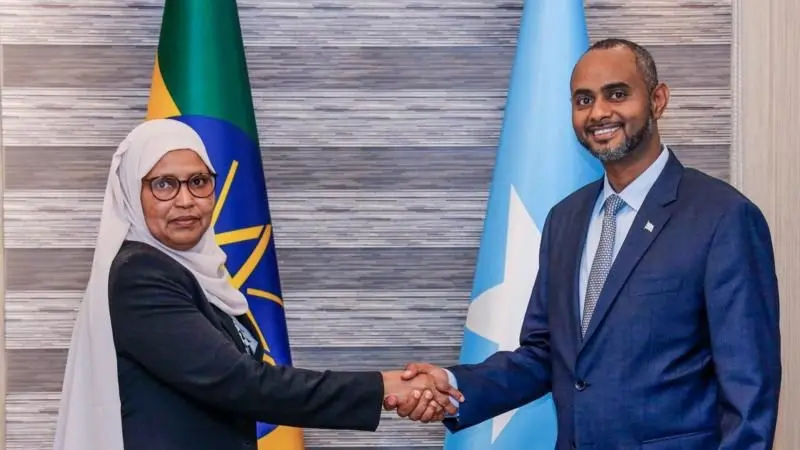Ethiopia and Somalia's Strategic Alliance: A New Chapter in Peacekeeping and Regional Stability
Ethiopia and Somalia have reached an agreement to cooperate on a new peacekeeping mission under the African Union (AU) framework. This development comes as part of ongoing efforts to address security challenges in Somalia, primarily targeting the insurgent group Al-Shabaab. Below is an in-depth analysis of this cooperation, its context, and its broader implications.
 |
| image source: The Ministry of Foreign Affairs of Ethiopia |
Context of the Agreement
Al-Shabaab Threat
Al-Shabaab, an Islamist militant group with ties to Al-Qaeda, has been a persistent threat in Somalia and the broader region. Despite ongoing counterinsurgency efforts, the group continues to conduct attacks, control territories, and disrupt stability. The AU has spearheaded several peacekeeping missions in Somalia, including the African Union Transition Mission in Somalia (ATMIS), which is being succeeded by this new initiative.
Ethiopia’s Role in Regional Security
Ethiopia, with one of Africa's largest and most experienced military forces, has long been a key player in regional security. It has previously contributed troops to AU-led missions in Somalia and has directly engaged Al-Shabaab within its borders. Ethiopia's renewed commitment signals its intent to maintain influence in regional security architecture.
Diplomatic Engagements
In December 2024, Ethiopia and Somalia agreed to technical talks under Turkish mediation to address disputes over Ethiopia's agreements with Somaliland. Somaliland, a self-declared independent region, has been a contentious issue in Somalia's sovereignty. These talks are critical to ensuring that broader cooperation on security issues is not derailed by unresolved territorial and political disputes.
Details of the New Peacekeeping Mission
The AU's new mission will focus on bolstering Somalia's security infrastructure to enable a gradual transfer of responsibilities from international forces to Somali national security institutions. Ethiopia's participation brings:
- Military Expertise: Ethiopia's experience in counterinsurgency will enhance operational capabilities.
- Resource Mobilization: Ethiopia's contribution includes troops, logistics, and strategic planning.
- Regional Integration: Joint operations with Somali forces could foster better coordination and trust.
The mission's deployment is expected later this month, marking the next phase in Somalia's stabilization process.
Key Issues and Challenges
Sovereignty and Territorial Disputes
Somalia views Ethiopia's agreements with Somaliland as undermining its territorial integrity. While the peacekeeping mission focuses on security, unresolved diplomatic tensions could spill over, complicating collaboration.
Regional Dynamics
The Horn of Africa is a politically complex region where Ethiopia, Somalia, Eritrea, Kenya, and external actors like Egypt have overlapping and sometimes conflicting interests. Egypt's recent announcement to send troops to the same AU mission adds another layer of complexity, as Ethiopia and Egypt have strained relations over the Grand Ethiopian Renaissance Dam (GERD).
Logistical and Operational Hurdles
Coordinating a multi-national force under AU leadership involves challenges such as command structure integration, resource allocation, and ensuring that all participating countries adhere to unified strategic goals.
Funding and Sustainability
AU missions often rely on external funding from the United Nations, European Union, and other international donors. Ensuring sustained financial and logistical support is critical to the mission's long-term success.
Implications of the Agreement
Strengthened Bilateral Relations
Ethiopia and Somalia's collaboration could mark a turning point in their diplomatic relations, creating a united front against shared security threats.
Enhanced Counterterrorism Efforts
The combined resources and expertise of Ethiopia and Somalia may lead to more effective operations against Al-Shabaab, potentially weakening the group's influence in the region.
Potential for Broader Regional Cooperation
If successful, the mission could serve as a model for collective security in the Horn of Africa, encouraging other nations to engage in similar cooperative frameworks.
Conclusion
The Ethiopia-Somalia agreement to cooperate on the new AU peacekeeping mission reflects a strategic alignment of interests aimed at addressing one of the region's most pressing security challenges. However, the success of this partnership will depend on resolving underlying diplomatic disputes, managing regional dynamics, and ensuring the mission's operational effectiveness. As deployment begins, the international community will closely watch this collaboration as a litmus test for sustainable peace and stability in the Horn of Africa.

Comments
Post a Comment